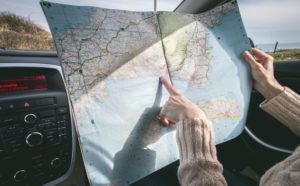Will You Be Taking a Holiday Car Trip This Year?

Traveling to spend the winter holidays with loved ones is an American tradition. It might be the time when everyone in the family gets together to share beloved foods, heirloom decorations and activities. New babies meet the family. Everyone checks in on the oldest family members. The memories created last for years to come.
But during this pandemic year, things are different. The Centers for Disease Control and Prevention (CDC) warns that gatherings with family and friends who don’t live with us can increase our risk of exposure to—or spreading—the virus that causes COVID-19. “Postponing travel and staying home is the best way to protect yourself and others this year,” CDC experts say.
Yet some families have decided to chance it. Hesitant to fly, they may have opted for a road trip instead. They perceive this as safer, and planning a road trip allows for more flexible plans. Hopefully they will be taking safety precautions like quarantining ahead of time, testing before they leave, wearing a mask around others, and practicing physical distancing and good hygiene at the gathering.
But what about safety along the way? A safe road trip this year will require some extra planning:
1. Learn about the COVID-19 situation at your destination and in areas through which you’ll be traveling. Many states are currently experiencing high numbers of cases and hospitalizations, and some have put travel restrictions into place, along with mandates on masks, quarantining, and limitations on gatherings. The CDC offers an up-to-date list of restrictions, searchable by zip code. AAA has a map of travel restrictions. Check this information, and check again right before you leave.
2. Protect against the virus during the drive. Bring along all the safety items we are advised to have at home, such as a supply of face masks, hand soap and hand sanitizer, disinfecting wipes and a thermometer.
3. When you stop for gas or to use the restroom, take precautions. Don’t enter an establishment if employees and other patrons aren’t wearing masks or practicing safe physical distancing. Avoid going into public restrooms with people who aren’t part of your group. Wash hands thoroughly with soap and water and use a paper towel to touch surfaces, if possible. Clean and disinfect surfaces of your car frequently.
4. BYO meals and beverages. Rather than risk one more opportunity of exposure by stopping for a restaurant meal, consider packing your own road food, beverages and water. Bring a cooler to keep perishables safe.
5. Check out hotels before you check in. Instead of crowding into Grandma’s house like they usually do, some families are seeking to lower the risk by staying in a hotel or other lodging. AAA reminds us, “Prior to any hotel stay, call ahead to ensure your hotel is open and ask what precautions they are taking to protect guests. Ask about social distancing protocols like capacity reductions in common spaces and hotel staff requirements to wear masks at all times.” Be prepared to take your own precautions by wiping down surfaces with disinfecting wipes when you arrive, and frequently during your stay.
6. Get your vehicle ready for the trip. AAA says they expect to rescue more than 400,000 stranded motorists over the holidays. The organization will be taking precautions against COVID-19, but a random repair shop you stop in during an emergency may not be! To lower the possibility, before you head out, get an oil change, and be sure your battery, tires and wiper blades are in good shape.
7. If you’ll be driving in wintery conditions, taking precautions is more important than ever! The CDC says we should keep our gas tank full to avoid ice in the tank and fuel lines and use a wintertime windshield cleaner formula. If we are stranded or delayed by snow and ice, it could be harder to get help—and the help we get could expose us to the virus. Along with your mask supply and sanitation kit, have a wintertime emergency kit along, which would include:
- cell phone, portable charger, and extra batteries
- blankets
- extra food and water
- booster cables, flares, tire pump, and a bag of sand or cat litter (for traction)
- compass and maps
- flashlight, battery-powered radio, and extra batteries
- first-aid kit
- plastic bags (for sanitation).
8. Get a flu shot. Most likely, by the holidays no one at your gathering or in your family will have received the COVID-19 vaccine, but this year’s seasonal flu shot is available, and it’s not too late to get it. This will help everyone avoid a “twindemic” of COVID and the flu—a situation that individuals and communities certainly don’t need! The coronavirus isn’t the only germ that likes to hitch a ride with holiday travelers.
Source: IlluminAge AgeWise with information from the Centers for Disease Control and Prevention (CDC) and AAA.

